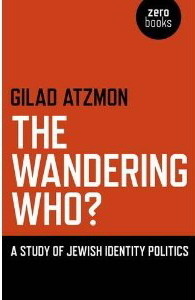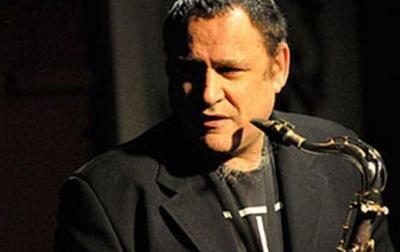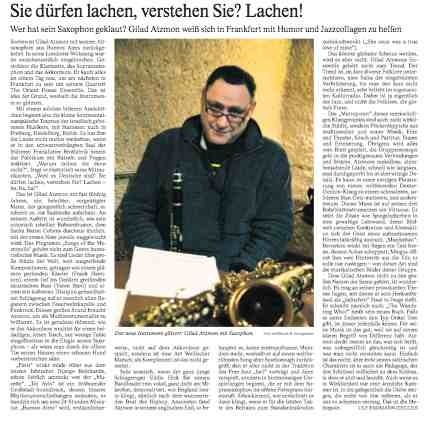Gilad Atzmon's Blog, page 95
April 30, 2013
ESPECIAL ANNUR NOTICIAS:Gilad Atzmon en Argentina - Part 2
I believe this is very important interview. I am talking about the phantasmic nature of the the Jewish past, Shlomo Sand, the Exile, the Holocaust. Yet, one question remains open, why Jews face so many Shaos? I argue that Jewish historians always fail, they look onto particularities but turn blind eye to essentiality and the grand narrative. Time is ripe to deal with true meaning of Jewish identity politics. If Israel is the Jewish State, we must ask what this title entails.

The Wandering Who? A Study Of Jewish Identity Politics and Jewish Left's spin particular Amazon.com or Amazon.co.uk
IDF trains dogs to attack Muslims
MK Ahmad Tibi - IDF soldiers train dogs to attack any Arab who says "Allah Akbar!"
Look at this
and this
Italy (mini Tour) next week
http://ap0ti.blogspot.co.uk/2013/03/gilad-atzmon-tour-italiano-maggio.html
Ecco le date del tour italiano di Gilad Atzmon. Vi invitiamo a visitare regolarmente questa pagina per aggiornamenti.
06/05/13: Trieste - bookstore/cafe Knulp, via madonna del mare 7/a: presentazione del libro L'errante Chi? prima del concerto (duo con il pianista Angelo Comisso) - ENTRATA LIBERA
07/05/13: Venezia - Università Ca' Foscari, Teatro ai Frari; presentazione del libro L'errante Chi? alle 16:00 con il professor Luigi Vero Tarca; concerto a seguire (con il pianista Angelo Comisso) - ENTRATA LIBERA
08/05/13: Chiavari - Modà-Cafè, via Rivarolo 44 (Centro Storico): trio con Max Rolff & Enzo Zirilli - Clicca qui per maggiori informazioni
10/05/13: Torino - Folk Club, trio con Max Rolff & Enzo Zirilli
Prevendita biglietti (a breve) sul sito Maison Musique; tel. +39 011 95.61.782 - Fax +39 011 95.54.546. E-mail: info@maisonmusique.it
11/05/13: Genova - presentazione L'errante Chi? nel pomeriggio, alla libreria Books in the Casba, vico del fieno 40r. Concerto al Count Basie, vico Tana, 20r: trio con Max Rolff & Enzo Zirilli - Clicca qui per maggiori informazioni
Pappe's Discomfort

By Gilad Atzmon
Ilan Pappe is an important voice. One of those courageous historians, brave enough to open the Pandora box of 1948. Back in the 1990s Pappe, amongst a few other Israeli post-Zionists, reminded Israelis of their original sin - the orchestrated, racially-driven ethnic cleansing of the indigenous people of Palestine - the Nakba.
But like many historians, Pappe, though familiar with the facts of history, seems either unable to grasp or reluctant to address the ideological and cultural meaning of those facts.
In his recent article, When Israeli Denial of Palestinian Existence Becomes Genocidal, Pappe attempts to explain the ongoing Israeli dismissal of the Palestinian plight. Like Shlomo Sand, Pappe points out that Israeli President Shimon Peres’ take on history is a “fabricated narrative.”
So far so good, but Pappe then misses the point. For some reason, he believes that Peres’ denial of the Palestinian’s suffering is a result of a ‘cognitive dissonance.’ i.e. a discomfort experienced when two or more conflicting ideas, values or beliefs are held at the same time.
But what are those conflicting ideas or values upheld by Israelis and their President which cause them so much ‘discomfort’? Pappe does not tell us. Nor does he explain how Peres has sustained such ‘discomfort’ for more than six decades. Now, I agree that Peres, Netanyahu and many Israelis often exhibit clear psychotic symptoms, but one thing I cannot detect in Peres’ utterances or behavior is any ‘discomfort’.
I obviously believe that Pappe is wrong here – expulsion, ethnic cleansing as well as the ongoing abuse of human right in Palestine, are actually consistent with Jewish nationalist supremacist culture and also with a strict interpretation of Jewish Biblical heritage.
April 27, 2013
April 26, 2013
Jüdische Allgemeine Exposed By Evelyn Hecht-Galinski
Introduction by GA: In the following article, German author and commentator Evelyn Hecht-

Galinski exposes Jonathan Scheiner and the Jüdische Allgemeine as Hasbara operators.
Jüdische Allgemeine Exposed
By Evelyn Hecht-Galinski
(Translated by Elisabeth Lauck-Ndayi)
Yet again we have evidence of how the Jüdische Allgemeine (JA) deals with any criticism of Israel. In JA on April 4th, 2013 you can find a peculiar article titled “Self-hatred and Saxophone“(1), writhen by Jonathan Scheiner.
[image error]Scheiner’s article consists of false accusations that indicate that not only has he failed to consider Gilad Atzmon`s writings on music, politics and philosophy but that he also has probably not read Gilad Atzmon`s book. So straightaway, let me recommend each reader and interested person read Gilad Atzmon’s new book: “The Wandering Who”, published in 2012 by Zambon Verlag.
In the first paragraph Scheiner writes “Gilad Atzmon is yet to be denied an entry permit to Germany“ and only then does he mention Atzmon’s current European jazz tour. This alone reveals Scheiner’s true face. Is it not the Israeli regime that punishes critics of Israel with the denial of an entry permit? Think of Noam Chomsky, Norman Finkelstein or even Gilad Atzmon - all denied entry to Israel. Is there any other lobby except the Jewish one which creates such ‘shit lists’ against its critics?
Jonathan Scheiner admits that Gilad Atzmon is an exceptional saxophonist, one of the greatest jazz artists of our time and that it is no surprise that Atzmon’s current world tour, as he travels from Argentina to Germany with his Orient House Ensemble, is indeed very successful, ..
But after the praise for the genius musician comes the usual poison - a totally misleading comparison between Atzmon and Richard Wagner - an attempt to equate Wagner’s loathing of Jews with Atzmon’s loathing of Zionism and Jewish politics. .
So, let us ask ourselves why Gilad Athmon lives in exile in London and why he criticizes Israel. Did he not experience events during the first Lebanon War that opened his eyes and made him a harsh critic of Israel? So would it not have been terrible if, after all he had witnessed, Gilad did not act as he does? Do not all us critics of Zionism and Israel reflect on our experience and draw a lesson from it? Scheiner writes, “His anti-zionism rather often turns to ordinary hatred of Jews.” Here, Scheiner clearly positions himself at the forefront of Hasbara as, in the usual way, he conflates and confuses terms like ‘anti-Zionism’, ‘antisemitism’ and now even the new notion of “hatred of Jews“. And this false portrayal is made deliberately in an effort to silence Israel’s critics. Once again, the JA is proved to be Israel’s “Stürmer”.
April 25, 2013
Silvia Cattori With Gilad Atzmon

Gilad Atzmon: “With true music I want to go back to those kinds of unique feelings of authenticity”
.23 April 2013
Silvia Cattori: Is your new album Song of Metropolis different from previous projects?
Gilad Atzmon: To start with, I have been touring with the Orient House Ensemble for more than 12 years. Until now our music was an attempt to integrate the oriental sound into Jazz and vice versa. Songs Of The Metropolis is a completely different project; it is an attempt to find the sound, the colors that remind us what home is all about.
In the last three decades we have been invaded by globalism, by big monopolies, those who tell us what car to drive, what music to listen to, what clothes to wear, and I am really tired of it all.
We have seen too many people who rather than exploring their authentic self, they for some reason prefer to identify with one sort of margin or another. They speak ‘as a Jew’, ‘as a black’, ‘as a gay’, ‘as a woman’, ‘as a musician’. Rather than thinking for themselves, they prefer to identify with something else. I really thought that music is the way to knock it down; to try to remind you of the colors that make you (as yourself) cry, make you feel, make you love, make you hate; every city in Europe has a bell, a unique bell. If you travel a thousand miles but suddenly you hear the bell of the church of your home town you feel like home, you are at home. That is what I try to do. I try to bring to light different bells. Look at us, I am here with you having breakfast in Thalwil [village in the German part of Switzerland], and everything we eat here is from here; and if I do a blind test when I am in America, you put Gruyere cheese on my plate it would feel for me like Switzerland.
I want to celebrate authenticity; not to be afraid of patriotism; not to be afraid of national feelings; to learn how to celebrate nationalism but not at the expense of anyone else. The problem that we have with nationalism is that many times in the past it has been celebrated on others’ expense. Zionism was celebrated at the expense of the Palestinians. Nazism was celebrated at the expense of the rest of Europe. But at the moment this is not unique to nationalism. Because when we look at liberal democracies such as America and Britain we see a clear repetition of the same pattern. They are clearly celebrating their symptoms at the expense of the entire Arab world.
With music and beauty I want to go back to that kind of unique feeling of authenticity. However, it is not very simple; I play a tune from Buenos Aires and I am not Argentinean. I play a tune from Berlin and I’m not German. I am under an imminent danger of becoming a Zelig. This in itself is a clear Jewish phobia that I have to deal with. I believe that my humor is there to rescue me when I surf too close to the wind. You witnessed it yesterday; people are really having a great time listening to this music. It is a lot of fun to watch.
In Germany a lot of people complained about my Berlin tune. They say: “How is it possible that you gave Argentina ten minutes and for us you give just two”. They say that it is kind of Germanism, they complain that I reduce Germany into a Weimar cabaret. And they are actually correct. For some reason this is how I connect with the ‘German sound’. Interestingly enough, the people who produced that type of Weimar Cabaret were largely Jewish. There must be a subconscious bond here that I myself fail to grasp yet. After all, I was a Jew for the first 30 years of my life.
April 23, 2013
Gilad Atzmon on TSF Jazz, France (audio)
Talking about music, beauty, globalisation and aesthitic survival...
Tonight we are launching Songs of the Metropolis in Paris at Sunset Jazz club http://www.sunset-sunside.com/2013/4/artiste/1001/1477/
April 22, 2013
An Incredible Review in the Frankfurter Allgemeine Zeitung, 19.04.2013,
 You may laugh – you understand? Laugh!
You may laugh – you understand? Laugh!
BY Ulf Erdmann Ziegler
For PDF of Frankfurter Allgemeine Zeitung click here
19.04.2013
Who has stolen his saxophon? Gilad Atzmon finds his way with his sense of humour and Jazz collages
Just now Gilad Atzmon has returned with his alto saxophon from Buenos Aires. In the meantime his flat in London was burgled. His clarinet, the soprano saxophon and his accordion were all stolen. The same day he bought all these instruments anew because he was supposed to be in Frankfurt the following day together with his quartet – The Orient House Ensemble. That was the reason his instruments were shining so much.
With such a bitter litte anecdote the continental European tournee of the Israel born musician started, with stations in Freiburg, Heidelberg and Berlin. It had not totally spoiled his parade when troubling his audience with riddles and questions in the totally black coated hall of a former Frankfurt bread factory. “Why on earth don`t you laugh?” he askes his musicians. “Because they are Germans! You may laugh, you know. Laugh, ha, ha, ha”!
Tis is Gilad Atzmon, almost 50 years old, a corpulent and spiritually minded man sometimes glancing up to the ceiling in a painstrikken way. During his performance it is strange how his notoriously shrill sense of humour on stage, quite similar to that of Sacha Baron Cohen, is always brushed aside with the first sound of music. His program “Songs of the Metropolis” is not part of the genre of humorous music. They are songs about the great cities of the wolrd, great compositions supported by a glasslike sparkling piano (Frank Harrison), an acoustic bass reverberating deep into the indestines (Yaron Stavi) and a drum set played with extreme discipline with almost all registers between fire brigade band and funkrock. Atzmon needs this great sound in order to deliver a brilliant performance as multi-instrumentalist. It is very moving how he works on his accordeon for a casual and silent fanfare, only a few beats (tacts) plaited in the elegy of his saxophone – as if seeing a shy dog straying past.
“Paris” is wearily waiving from the past Django Reinhardt century, already lovely entwined by the “Musette”. “Tel Aviv” is a booming city soundtrack its bizzare shifts of rhythm denoting as if it was a 24 hour miniature. Amazingly, “Buonos Aires” ist not played on the accordeon, but as a kind of Weill marsh; this is not meant to be a compliment.
It is very funny when the very young drummer Eddie Hick demonstrates for his bandleader purely vocal, close to the microphone, how England sounds, to be specific like the banging Hiphop beat. Otherwise Atzmon claims he did not find any more metropolitan melodies in his English exile. That is why he came back to the world famous song about Scarborough. But he does not safely play it in the tradition of free jazz and thus overplay it, but starts with some double-edged detours shouting them out with his soprano saxophon into the open Fortepiano. It is shocking the way it sounds when he returns for the last beats of the refrain to the main microphone (“She once was a tru love of mine”).
This may turn to a global soft soap, but it does not. Gilad Atzmon’s ensemble is not part of this trend. It is the common trend to mix diverse folklore with jazz, a salsa of fancied fraternization until you do not recognize the jazz any longer, which is very popular in the so-called culture radio. It is actually jazz and not folklore which is the global form of music.
The “Metropolises” of this strange sound project are not real cities but rag rugs made of traditional and new music, film and theatre, noise and score, dream and recollection. After all everything is sight-read. The group’s energy goes into accurate connections and fractions. Atzmon`s faultless and breathtaking music cycles, fast or slow, are intensely practised even to ludicrous details. In one single phrase he manages to mutate from a fully sounding Dexter-Gordong-sound to a small and solid one of Stan Getz and vice versa. This man is virtuoso playing his reed instruments. He sets his citations like mirror peaces on a huge screen, the pictures of which wether concrete or abstract can be well imagined by an attentive listener. “Manhatten”: While it is raining Bernstein is waving to a taxi the axis of which is rattling. Mignus sitting on the back seat opens the door for him, he should come in – the musical images of this group are of this kind.
That Gilad Atzmon does not belong to the great names of the in-crowd, is somehow strange. It may be due to his provoking assumptions by questioning his birth place as a “jewish” state. He also wrote: “The Wandering Who?” which is the title of his new book. In case there should be the type of uncle Tom within the exiles, at any rate, this man is not. For his music this is fine, because it rests upon a clear definition of difference. Atzmon always thinks of things that do not fit, concepts beyond comprehension and at the same time one does not understand. This is not simple; but in spite of his satirical character he is also a teacher providing the key to the castle in which he is sitting and listening. But even if this is turning out to be a small and humble room, which thieves now and then tend to board and stealing more of the things than he is able to give us as a present.
Translated by: Elisabeth Lauck Ndayi from Freiburger Friedensforum



